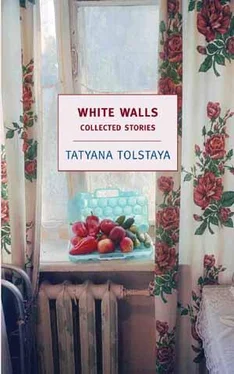“No worms?” she would ask, grave and anxious. “No, no, Zhenechka, perfectly wonderful mushrooms each and every one!” And she would calm down, never dreaming that we could possibly fib, while behind her back, wild with adolescent laughter, someone would wipe the straining spoon clean of the dried gray foam teeming with white corpses.
And everyone else would look away in embarrassment, as if we’d deceived a child.
…August approaches, evening descends; the dark forest stands with its back to us, facing the sunset, and watches the liquid crimson islands burn out in orange seas high overhead. The first star is out. The night damp gathers. Women sitting on porches pull the hems of their skirts over their knees, speak more softly, raise their dark faces to the heavenly stillness. A black tomcat steps noiselessly out of the black grass, places a black mouse on the stoop. Soon the last heavenly island will be extinguished, darkness will move in from the east, the lake will speak in heavy, muffled waves; the wild lake wind will billow, straighten out, and moan, tearing off into dark, unpeopled expanses to bend bushes, fell ripe seeds, drive nameless, prickly orbs through cooling clover valleys and through untrodden copses; with a drone, it will ascend to the agitated sky in order to blow away the first wisps of feeble, ephemeral stars as they slip into the abyss. Soon it will be time to get up, sigh, shake off specters, walk across the old boards; cups will clink, gas burners will flare like blue asters, the evening tea will trill. Refrigerators will clank open, and the women, back from the stars, will stare mindlessly into their rumbling, dimly lit interiors, slowly recognizing the contours of terrestrial cutlets or dense, frozen cottage cheese.
Zhenechka, quietly aging, goes through the house, opens the kitchen drawers, whisks some sort of rag about, and steps out onto the silenced porch, holding her breath so as not to frighten the stillness. She puts her hands on my shoulders—dry old hands, chilled to the marrow—and I suddenly feel how small and light she is, how easily the night wind could carry her away to the dark, clamoring distances.
A lengthy, tranquil moment sets in, one of those moments when superstition says an angel is passing over, and Zhenechka begins, “Now, I remember…,” but we’ve all come to, started talking, and stood up; the porch clatters under our feet, and Zhenechka rushes to tell us the rest, but it’s too late, the angel has come and gone in a gust of wind that covers her words. I see her lips moving, her naive, loving gaze reach out; the wind grabs Zhenechka, the years spill from the sky like stars and fall onto the greedy earth where they grow like thistle, goosefoot, and couch grass; the grasses rise higher, close in; the old house chokes and dies, footsteps are erased, paths are lost, and oblivion blossoms everywhere.
An old person is like an apple tree in November: Everything in him is falling asleep. In anticipation of night the sap stops flowing, the insensitive roots grow chill and turn to ice, while slowly, slowly the split branch of the dusty Milky Way spins overhead. With its head leaning back, its dry stumps stretched to the frost-furred stars, the obedient, perishable creature waits, submerged in somnolence, expecting neither resurrection nor spring, waits for the dull, speechless swell of time to roll over it, carrying everything along.
Time passed, and we became adults. Busy with our urgent affairs and our friends, our books, and our children, we brushed Zhenechka’s life aside; it was harder and harder for her to leave her house, and she would phone to relate things that interested no one.
For a minute or two, I listen to her slow voice, then lay the receiver softly on the telephone table and run off: in the kitchen pots are boiling, hot oil is shooting from the skillet; in the dining room there’s lively conversation, laughter, and news, and they’re calling me to share it all. The doorbell rings, a frozen, rosy crowd enters in raucous fur coats, there’s the clatter of skis, the thud of feet, the floors shake, the windowpanes shake, and beyond the windowpanes the frosty trees shake, bathed in a dusky winter gold.
Zhenechka’s voice lies cozily on the tablecloth, unhurriedly telling the telephone book, ashtray, and apple core about its joys and worries. Complaining and marveling, admiring and wondering, her soul flows from the telephone receiver holes in an even stream, spills over the tablecloth, evaporates like smoke, dances like dust in the last rays of the sun.
“Why is the receiver off the hook?” someone asks. I grab the phone with barely wiped wet fingers, and shout: “Yes, Zhenechka! Of course, Zhenechka!” and rush away again. Her hearing aid sings and chirps; she doesn’t notice a thing.
“Well, what’s she saying?” asks a passing member of the household.
“Let me listen…. Something about some Sofia Sergeevna who went to the sanatorium last summer and the roses they had there…. She says the roses were red and their leaves were green… in the sky was the sun… but at night the moon… and the sea was full of water… people swam, and got out of the water… and dressed in dry clothes and the wet clothes dried out… oh, and she asks how we are. Fine, Zhenechka! I said, we’re fine, Zhenechka! Just fi-ine! Yes! I’ll tell them! I’ll tell them!”
We were all she had left in the world.
But there came a day in the middle of winter when—shaken to the depths of her soul, armed with a cracked walking staff, the remains of her boyar hat pulled low—Zhenechka appeared on the threshold with a long blue envelope in her hands.
Words buzzed and fluttered in the envelope, telling her that she was not alone in this world; that quite close by—just a stone’s throw away, beyond the cold gulf, beyond the arc of green ice and the swishing pines, in the snow-covered city of Helsinki (formerly Helsingfors), in an A-frame house, around a cheerful fireplace—there lived the offspring of Zhenechka’s long-lost favorite sister; that these offspring were waiting, couldn’t wait for dear Aunt Eugénie to enter under the peaked roof, into their hospitable half-Finnish embraces, and to lay cellophane-wrapped flowers on the grave of her dear sister, who rests in a neat Finnish cemetery.
We saw Zhenechka off at the station. She was flustered and embarrassed, like Cinderella stepping into the pumpkin carriage drawn by mice; she clutched her canvas suitcase with her toothbrush and a change of underclothes inside it. We had seen these undergarments at the dacha, on the lakeshore at dawn, when Zhenechka did the hygienic exercises suitable for her age. The shifts consisted of rectangular, sackcloth panels, meticulously joined with a solid, eternal seam; these severe, soldierly items knew neither darts, nor flounces, nor any other tailor’s mischief—they were just sturdy panels, like the white pages of a story about an honest, hardworking life, usefully lived.
A month later we went to meet her at the same station, ran the entire length of the train, and couldn’t find her. From one car emerged an impressive old lady with eyebrows black like a fallen angel’s and thickly blushed cheeks, dressed in fluffy furs and a dignified hat. The porter carried her scented suitcases. Someone recognized Zhenechka by her orthopedic shoe.
“Well?” we asked.
“They’ve got everything over there,” she said. And, overcome, she nearly fainted.
We took her home and made her tea.
After that, Zhenechka went to Finland every spring. And then each summer—shining and crazed, happy and youthful, she grew unheard-of flowers from Finnish seeds in the fragrant, revitalized garden of our dacha. Zhenechka’s lacy underwear, celestial and lemon-colored, hung on a line above the flowers, and in her room incredible objects were heaped on her shelf: perfumes, lipsticks, nail polish. And the roses—red roses which had behaved capriciously for many years—suddenly flourished under Zhenechka’s hands, shooting out new buds in swift succession. The Finnish fertilizer must have helped.
Читать дальше












